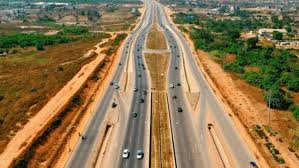German financial giant Deutsche Bank has led a group of international and regional lenders to provide a $747 million syndicated loan to fund the first phase of the Lagos-Calabar Coastal Highway project. The highway is one of the key projects under the Federal Government’s Renewed Hope Infrastructure Development Agenda.
The loan will finance Phase 1 Section 1 of the project, which spans 47 kilometres from Victoria Island to Eleko Village in Lagos State. According to a statement by the Federal Ministry of Finance, this marks the largest syndicated loan ever arranged for a road project in Nigeria.
Minister of Finance and Coordinating Minister of the Economy, Wale Edun, said the transaction shows Nigeria’s ability to attract international capital again, as confidence returns to the economy due to recent economic reforms.
“This deal reflects the success of our macroeconomic reforms and the return of international capital to support Nigeria’s development,” Edun said. “We are focused on financing infrastructure in ways that are sustainable, transparent, and catalytic — and this transaction is a model of that vision in action.”
Deutsche Bank served as the Mandated Lead Arranger and Bookrunner, which means it played a central role in organising and managing the loan syndication. Other financial institutions involved include First Abu Dhabi Bank, which is the Agent and Intercreditor Agent; African Export-Import Bank (Afrexim); Abu Dhabi Exports Office (ADEX); ECOWAS Bank for Investment and Development (EBID); Nexent Bank N.V. (formerly Credit Europe Bank N.V.); and Zenith Bank, through its offices in Nigeria, the United Kingdom, and Paris.
To protect all the parties involved, Islamic Corporation for the Insurance of Investment and Export Credit (ICIEC) provided partial political and commercial risk insurance. This ensures that lenders and investors are shielded from potential risks, such as changes in government policy or instability that could affect repayments.
Chief Executive Officer of ICIEC, Dr. Khalid Khalafalla, noted that the project is designed to have long-term economic impact. “Through ICIEC’s sovereign risk coverage, we are unlocking vital infrastructure that will ease congestion, stimulate trade, and support inclusive growth. This initiative will also create jobs, build local skills, and support small and medium-sized enterprises across West Africa.”
The highway is being constructed by Hitech Construction Company Limited, a Nigerian engineering firm. The contract is EPC+F — which means Engineering, Procurement, Construction, and Financing. This model ensures that Hitech is also involved in securing some of the financing, linking their technical performance to financial responsibility.
Managing Director of Hitech, Dany Abboud, said over 70 percent of the first section is already completed. He added that the company’s use of Continuously Reinforced Concrete Pavement (CRCP) — a highly durable construction material — will ensure the road lasts at least 50 years with minimal maintenance.
“We are proving that Nigerian engineering — backed by structured international finance — can meet global standards. Our use of CRCP technology ensures durability and cost-efficiency,” Abboud said.
Minister of Works, David Umahi, said the Lagos-Calabar Coastal Highway is more than just a road. He described it as a national asset that will promote trade, tourism, logistics, and industrial development, particularly in southern Nigeria.
“This transaction is a vote of confidence in Nigeria’s economic reform agenda,” Umahi said. “It sets a strong precedent for future partnerships between government and the private sector.”
The Ministry of Finance also highlighted that the project will include a tolling system, which will help the highway become self-sustaining and more attractive for future investors. The government believes this success will open doors to more bankable infrastructure projects financed by private capital, thereby reducing dependence on public funds and speeding up delivery.
The Lagos-Calabar Coastal Highway is expected to improve regional integration, lower transportation costs, and enhance access to ports, export processing zones, and industrial hubs along Nigeria’s southern corridor. It also aligns with the government’s long-term strategy of using infrastructure to stimulate economic growth and job creation.
